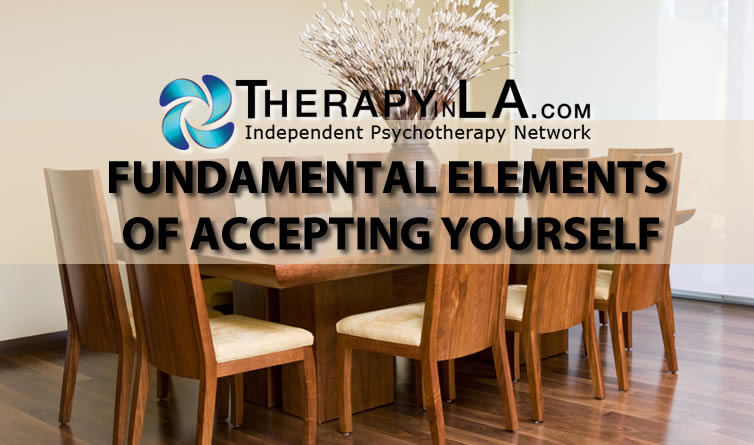
FUNDAMENTAL ELEMENTS OF ACCEPTING YOURSELF
The message to “be yourself” is often at the end of an adolescent or young adult film. The person who has tried to appear “cooler” than they really are has learned an important lesson in striving to be more authentic, and to forgo the facade. Yet it is not only a young person’s task to become their authentic self, but something that is important for all of us to work on throughout life.
Everyone adopts personas (a mask that we use in our social interactions) in order to function in our world. This doesn’t have to be a bad thing. Even though the store clerk had an argument with her boyfriend the night before, she has learned to put that aside and deal with her customers in an appropriate manner But at times the personas that we have developed so that we don’t appear needy to our partner, or to seem as though critical statements don’t hurt us when they do, may damage our relationships. Sometimes our personas get involved and they can keep us from being honest in our intimate moments.
Here is an apt metaphor to illustrate what it means to accept yourself. Imagine a large dining room table with a number of chairs around the table each of which is occupied by a part of yourself. Every part has a place at the table: the noble one, the petty one, the independent one, the needy one, the serene one, the anxious one, the angry one, the hurt one, the confident one, and the insecure one. They can sit next to one another and it is not contradictory. There is one “central” person who is aware of them all (you) and may feel comfortable with some at the table and not with others. That central person has perhaps said from time to time “But this isn’t me! I don’t do this! I don’t get angry and yell at people!” You may have denied a part of yourself because it doesn’t correspond with the persona you have about yourself. You’d like this part to go away and never come back. That can’t happen. As long as you know all the parts, you can have some ability to decide when a part shows up in social interactions and when it doesn’t.
The famous psychoanalyst Carl Jung called the “shadow,” the parts of ourselves that we don’t like, are embarrassed about or struggle to accept. The shadow plays an important role in our life and it is only when we begin to see and accept these disowned parts that we develop more clarity in our life. We begin to feel freer as we integrate these parts of ourselves.
As we go about our day we can hear our inner voice, which I refer to as the narrating voice (although often it’s volume is turned down low). That voice comments on what’s going on around us, and how we are doing. We may have a very critical narrator (“Wow, I really am an idiot. Everyone else in the meeting understood this and I didn’t. I am so stupid!”). Many people justify a negative narration saying that they get more motivated by “beating up on themselves.” The classic example is trying to develop the exercise habit: “I am so flabby and disgusting that I have to start working out otherwise I’m turning into an elephant!” Research shows that the critical narrating voice is not as effective as a positive one.
Years ago I was crossing a local park and overheard a young man who coaches kids in baseball. I was so transfixed with his ability, that I simply sat on a nearby bench and watched him coach. He said things like “Sam, that was great! You are getting much better at swinging the bat. The way you hold the bat and your posture are perfect. Now I want you to concentrate on the ball and when it gets a little closer to you, then swing.” With every nuance of the game, this coach pointed out what the boy was doing right, then gently instructed him on the next skill.
To develop an inner positive narrating voice, you must first pay attention to the voice that exists now. Perhaps the critical voice can be used at some point when you need to complete a project, that can point out problems. Yet it needs to be specific, because the global, all encompassing negative comment does not help. The positive narration can be “wow, I see how I got anxious at that party with those people. I don’t like that I get anxious in those situations, but I do. And maybe there are some things I can do to help my anxiety. I know I can be so critical of myself and expect that I have to say brilliant and hilarious comments, and maybe I can start by giving myself some time to listen and interact to feel calmer.” Other statements such as “I have time to learn this” or “I’ve done harder things in the past, so I have this”, can give us the opportunity to learn without expecting that we have a skill automatically. You can see how having a more positive inner voice can help you integrate the various traits of yourself, some that you don’t like, but that can nevertheless be helpful in your relationships. There are endless positive statements you can make to yourself, as well as accepting the parts that we struggle with, the parts that make us human.
Dr. Slate is a clinical psychologist practicing in Santa Monica. She is a member of the Independent Psychotherapy Network. You can contact Dr. Slate at (310) 582-0010 or shslate@aol.com.
Copyright 2019 by Susan Harper Slate, Ph.D.
